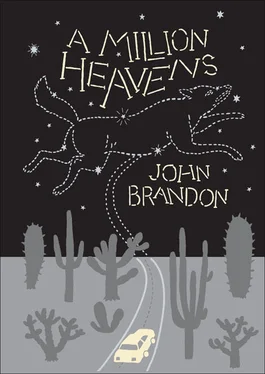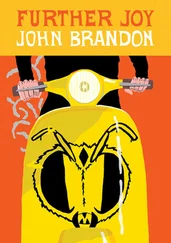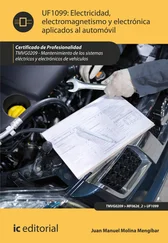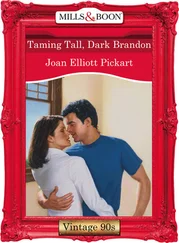The main hall shrunk and the library and bar both vanished completely. Even though Reggie had not sat and read a book — had only skimmed them in order to busy his hands and hear the sound of flipping pages and smell the failing glue — he missed the library. It had been a cozy alcove. In the main hall the perpetual dimness was trying, but in the library the same light had seemed soft and drowsy. Reggie hadn’t had one single drink at the bar but he missed it now that it was gone. It had been the only color outside the red leather of the piano bench and the big reading chair. He especially missed the perpetually ripe lemons and limes. Where the archway leading into the library had once been there was now concrete painted thickly gray. The library may still have been there for all Reggie knew, just inaccessible now, blocked off. Where the bar had been there was simply empty space. Reggie thought the floor looked faded, but that could’ve been in his mind. It reminded him of when he’d fix up a rich guy’s yard, a lawn , irrigated at great expense, and there’d be a kayak or something lying there and when you picked it up the grass underneath was sickly and pale.
Reggie’s laps around the hall were shorter now and took up little time, but they helped him empty his mind, a difficult thing to do when you were trying to do it. He walked backward for variety. He marched. One day he came around what he considered the last bend, the stretch where one lap ended and a new one began, and he stopped stock-still when he saw that the piano had been repaired. Reggie stood in silence for a minute and then approached the piano and stood before it like someone who’d worked his way to the front of a line. To be honest, he was dumbstruck. The piano seemed to have been restored to the exact condition it had been in before Reggie destroyed it. It wasn’t new now; it was still old but perfect again. Reggie could feel that he was smiling. He couldn’t tell if he was amused or if he was smiling in menace like the skull on the belt buckle his uncle had given him. The bench wasn’t fixed. The bench was scuffed and gashed. Reggie pushed it out of the way and stood directly in front of the piano. He brought the tip of his finger down on an A-sharp and to his ear it was precisely in tune. Reggie didn’t touch another key.
The light in the hall seemed to have dimmed even further, but like the stain left by the bar this could have been in Reggie’s mind. Or maybe his eyesight was faltering. Reggie had intermittent success denying it, but almost always now he was frustrated. Frustration was his baseline emotion and there was little to do about it except take it out on the tools. Reggie gripped the harmonica and reared back and hurled it straight up into the shadows and waited the moment or two that passed before it zipped back down and crashed to the floor. The harmonica was broken. Reggie shrugged. He left the thing lying on the ground, knowing it would likely be fixed. Reggie wasn’t sending a message this time like with the piano; he was breaking things because it felt good. Reggie was vastly disadvantaged. This was a game of patience and his opponent had an infinite supply. His opponent would win. You couldn’t beat a higher power. But also, somehow, it made no sense to give in. It made no sense not to extend the fight.
Since the moment Reggie had found himself in this hall — after perishing in the middle of a lovely day while humming a lovely new tune he couldn’t now remember — he’d been muttering to himself the way anyone did when alone. But now he got down flat on his back on his mat and openly addressed his captor. He spoke clearly without yelling. What he wanted to know was what bad thing he’d done, what important thing he’d left undone, to be singled out. He’d never once in his life on earth wished to be singled out. Had he wasted a talent? Had he broken sacred rules? What insidious problem had he been a part of? What duty had he shirked? Reggie asked his questions and then listened to the quiet swell up behind them.
He started to hear a buzzing, a low interminable ring, a noise similar to the ringing the morning after a show, but deeper than that, as if it had been planted in his head, as if it would grow rather than dwindle. Reggie was being harassed. He would be shoved and taunted until he gave up his songs.
The hall was shrinking even more and could no longer even be described as a hall. It was a room. Laps were now absurd. Reggie’s mat was gone and the floor was cold. There had been no temperature up to now, but the floor was growing chilly under Reggie’s bare feet and under his back when he laid down to rest. He rested in the spot where his mat had been, and it didn’t take long before he’d be shivering. He would’ve given anything to sleep like the living, to sleep like he used to, to be warm under a blanket and feel a slight hunger but be unwilling to get up for a snack because the bed was too cozy. He thought of what the morning felt like after a night of sleep, a steamy shower, a big breakfast that required a series of decisions — what kind of toast, how you wanted your eggs, bacon or sausage, hash browns or home fries. If the bar returned Reggie would’ve had a drink. He’d have an Irish whiskey with one ice cube in it because that’s what his father drank on the rare occasions when his father drank.
Reggie had never been stubborn when he was alive and suspected he was only faking stubbornness now. There were a couple things he did well and took pride in, but winning for the sake of winning had never interested him. Winning had never filled him with joy and losing had never devastated him. He’d played chess with Mr. Dunsmore to be polite, but had never been invested in the outcome. He’d put forth enough effort in school because everything went smoother if you earned good grades, but receiving a C had never gotten under his skin.
It was principle that was causing him to resist writing songs. Reggie hated bullying. He had never bullied nor allowed himself to be bullied and he didn’t want either end of it now, but at the same time he was starting to understand that if ever there were a place where principles were mute, this was it.
He didn’t know a thing. He was staggering around in a tight circle, humming. The only way to drown out the buzzing, which seemed to emanate from the direct center of Reggie’s brain, was to hum. And what humming led to was not lost on Reggie.
It was Christmas Eve, but nothing in the house would’ve told you that. Cecelia and her mother had never been huge on holidays, but they usually at least put a ham in the oven and hung a couple wreaths. They hadn’t even driven over to the Hispanic outskirts below Albuquerque, a tradition of theirs, to admire all the driveways lit with candles in stiff white bags. Cecelia’s uncle, who she hadn’t spoken to since last Christmas, wasn’t stopping by this year. He had a bunch of guests at the hotel.
Outside it could’ve been any time of year. The TV was set to the one network they still got, to a show about people who wanted to be inventors. This week the inventions had a holiday theme. The judges were mean to the contestants but nice as pie to one another.
“This teenager on the news.” Cecelia’s mother set aside the flimsy basin newspaper that still got delivered to the house every week. “He tried to commit suicide by drinking Woolite.”
Cecelia was a teenager, for another couple months. She didn’t feel like a teenager. She felt, when she was around her mother, like she was the parent and her mother the kid. This woman had taken care of Cecelia for the better part of two decades and now, what, she wanted the favor returned?
“He threw it all up. It was too gentle to do any damage, just like they advertise. Teenage boy.”
Читать дальше












